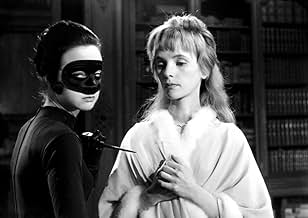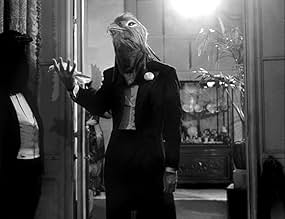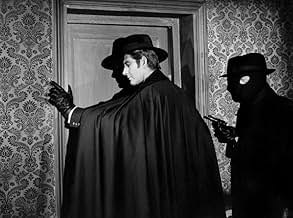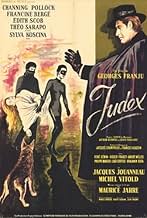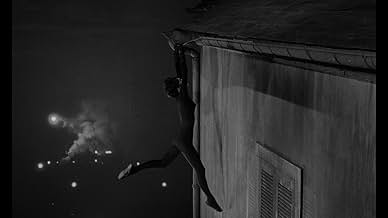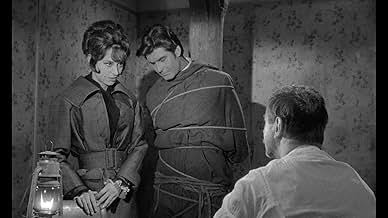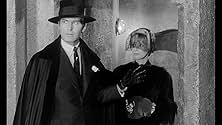CALIFICACIÓN DE IMDb
7.0/10
3.1 k
TU CALIFICACIÓN
Un banquero sin escrúpulos recibe una nota amenazadora, firmada por "Judex", en la que se le exige que devuelva el dinero a las personas a las que ha estafado. Se niega y parece que se enfre... Leer todoUn banquero sin escrúpulos recibe una nota amenazadora, firmada por "Judex", en la que se le exige que devuelva el dinero a las personas a las que ha estafado. Se niega y parece que se enfrenta a su destino.Un banquero sin escrúpulos recibe una nota amenazadora, firmada por "Judex", en la que se le exige que devuelva el dinero a las personas a las que ha estafado. Se niega y parece que se enfrenta a su destino.
- Dirección
- Guionistas
- Elenco
Opiniones destacadas
Franju's evocation of a lost innocent era of French silent cinema is a real gem, and a much neglected film. The film creates an air of gentle menace from the opening scenes featuring a bird-masked magician at a masked ball. We soon learn that he is, in fact, Judex, the legendary crime-fighter. He soon becomes engaged in a battle with a cat-suited female criminal. The plot itself is one-dimensional comic-strip stuff, as the above suggests, but what constantly impresses is the poetic set-pieces Franju sets up, particularly a burglary at a country house swathed in mists. The show is continually stolen by Francine Berge, as the criminal - she seems a not-too-distant relation of Diana Rigg in television's "The Avengers", at least in dress sense - and this highlights a slight problem. The hero, played by American magician Channing Pollock, is bland by comparison, as is Edith Scob's heroine-in-distress. It seems that the bad girls get all the fun! Overall, this is the type of film that doesn't get made any more, yet doesn't seem dated. Franju's more famous "Les Yeux Sans Visage" is, in terms of mood, very similar, as is Cocteau's breathtaking fairy tale, "La Belle Et La Bete". The sixties British horror, "The Haunting", also pulls the same trick of showing little by achieving everything through mood alone. Do try to see all of these if you get the chance.
The first "Judex" was made in 1916 and the late French critic Roger Boussinot was hard on Feuillade ,whose films were (I quote him) " brainwashing" .He was speaking of "Les Vampires" and "Judex" which ,for him,were hiding the atrocious reality.
Back in 1963,Franju,who had a penchant for mystery ("Les Yeux Sans Visages" "Pleins Feux sur l'Assassin" ) made a remake.He cast a conjurer(Channing Pollock) as the lead (which was not a bad idea after all for Judex being an almost surrealistic hero did not demand a great actor ) Franju used again his favorite actress ,Edith Scob,("les Yeux Sans Visage" ) whose eyes were the most beautiful (along with MIchèle Morgan's) in the French cinema.
Judex is some kind of mysterious Robin Hood,who comes to the rescue of poor people an unscrupulous banker has swindled . Franju's sense of mystery works wonder and creates a strange atmosphere with this hero with a bird mask .A sequence was filmed in Château-Gaillard ,les Andelys .
Back in 1963,Franju,who had a penchant for mystery ("Les Yeux Sans Visages" "Pleins Feux sur l'Assassin" ) made a remake.He cast a conjurer(Channing Pollock) as the lead (which was not a bad idea after all for Judex being an almost surrealistic hero did not demand a great actor ) Franju used again his favorite actress ,Edith Scob,("les Yeux Sans Visage" ) whose eyes were the most beautiful (along with MIchèle Morgan's) in the French cinema.
Judex is some kind of mysterious Robin Hood,who comes to the rescue of poor people an unscrupulous banker has swindled . Franju's sense of mystery works wonder and creates a strange atmosphere with this hero with a bird mask .A sequence was filmed in Château-Gaillard ,les Andelys .
Judex "1963 redux" has been produced as a homage to Louis Feuillade's original serial. The production values are very much aligned with that endeavour, so you can't blame Franju's work for a shortage of faithfulness, let alone dissecting it to pinpoint some lack of respect or understanding of the source material.
The point is the movie works as a homage, and then what? You can't tell a story in 1963 the same way it was told in 1916. At the time there was a developing medium, silent and with static setups, yet a medium Feuillade helped transition away from the filmed stage by making it closer to the action-packed serial pulp fictions.
So Franju adds nothing. This would be OK if it was the first shot at features from a naive cinema student, but here lacks something closer to a real movie, a movie with its own rhythm, its own structure and real suspenseful action not silent action designed to fit a frame.
It is true that Franju was more interested in remaking Fantomas. How would he have succeeded in doing this any better, i.e. matching the original popular success of fascination for a frightful villain? That takes much more work than a nice little artsy homage to the movies of yore.
The point is the movie works as a homage, and then what? You can't tell a story in 1963 the same way it was told in 1916. At the time there was a developing medium, silent and with static setups, yet a medium Feuillade helped transition away from the filmed stage by making it closer to the action-packed serial pulp fictions.
So Franju adds nothing. This would be OK if it was the first shot at features from a naive cinema student, but here lacks something closer to a real movie, a movie with its own rhythm, its own structure and real suspenseful action not silent action designed to fit a frame.
It is true that Franju was more interested in remaking Fantomas. How would he have succeeded in doing this any better, i.e. matching the original popular success of fascination for a frightful villain? That takes much more work than a nice little artsy homage to the movies of yore.
a decent film. not great, not good, not convincing. seductive for its flavor and for beginning. for the references. and for few scenes. action, drama, justice, the silhouette of good guy are old ingredients and that reduced the surprises. the atmosphere is well , not bad for remind the Edgar Poe's Red Death . but something missing. too predictable, with few characters in wrong places, without a remarkable acting, it is only nice and, maybe, useful for remember the spirit of old French cinema. but, despite the story, it has the sin to seems almost boring. and that could be all. without great virtues or ambitions, it is a decent movie. and that status could be enough for viewer.
Georges Franju is an unfairly neglected director - overshadowed by Godard and Truffaut, he fell quickly out of favour as a filmmaker, although he is revered as co-founder, with Henri Langlois, of the Cinematheque Française in Paris shortly before World War 2.
The influences to be seen in Franju's films are not those of New Wave directors: Hollywood film noir and trashy American novels. He is more in tune with German Expressionism and, as perhaps befits a film archivist, with silent cinema.
So JUDEX is a very affectionate tribute to Louis Feuillade, and shares its title with a 1916 serial. As the title character Franju cast a magician - Channing Pollock - and other actors include the wonderful Edith Scob (unforgettable in Franju's EYES WITHOUT A FACE), Andre Melies (son of Georges) and Theo Sarapo (one-time lover of Edith Piaf). The music is by Maurice Jarre, and adds to the dreamlike nature of the whole story.
JUDEX may not be a great film, but it is a truly wonderful film. Just let it wash over you, and the memory of it may haunt you for a surprisingly long time!
The influences to be seen in Franju's films are not those of New Wave directors: Hollywood film noir and trashy American novels. He is more in tune with German Expressionism and, as perhaps befits a film archivist, with silent cinema.
So JUDEX is a very affectionate tribute to Louis Feuillade, and shares its title with a 1916 serial. As the title character Franju cast a magician - Channing Pollock - and other actors include the wonderful Edith Scob (unforgettable in Franju's EYES WITHOUT A FACE), Andre Melies (son of Georges) and Theo Sarapo (one-time lover of Edith Piaf). The music is by Maurice Jarre, and adds to the dreamlike nature of the whole story.
JUDEX may not be a great film, but it is a truly wonderful film. Just let it wash over you, and the memory of it may haunt you for a surprisingly long time!
¿Sabías que…?
- TriviaAwarded the Coupe Jean-George Auriol 1963, by the jury's unanimous decision, in France.
- ErroresJust before Cocatin, the private detective, sits down at Favraux's desk, a moving shadow of the boom microphone is briefly visible on the curtains at the top of the frame.
- Citas
Alfred Cocantin: What's all this about nuns?
- ConexionesFeatured in Cinéma, de notre temps: Georges Franju, le visionnaire (1996)
Selecciones populares
Inicia sesión para calificar y agrega a la lista de videos para obtener recomendaciones personalizadas
- How long is Judex?Con tecnología de Alexa
Detalles
- Fecha de lanzamiento
- Países de origen
- Idioma
- También se conoce como
- Fantoma
- Locaciones de filmación
- Château-Gaillard, Les Andelys, Francia(Judex's hideout)
- Productoras
- Ver más créditos de la compañía en IMDbPro
- Tiempo de ejecución1 hora 38 minutos
- Color
- Mezcla de sonido
- Relación de aspecto
- 1.66 : 1
Contribuir a esta página
Sugiere una edición o agrega el contenido que falta

Principales brechas de datos
By what name was Judex (1963) officially released in India in English?
Responda
